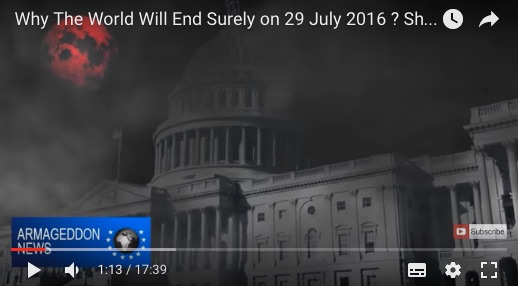Stand by for earthquakes: July 29 is when the world ends
The end of the world is today, July 29. Seriously.
Well, that's it, then. The world will end today. Don't bother to unblock the sink. That annoying verruca will trouble you no longer. Admittedly it's irritating that you've just forked out for a holiday on a nice Greek island, but in the scheme of things, that's the least of your worries.

Today, July 29, 2016, is THE DAY – at least according to End Times Prophecies (ETP). The organisation has made a YouTube video, complete with copious biblical references and narrated in a strangely mechanical posh English accent, predicting earthquakes, tidal waves, a "rolling cloud" and hundred-pound hailstones. It has, in addition, some truly dreadful animations.
More than 5 million people have watched it. Some of them are true believers. Some would like to believe it. Some watch it for the amusement value. Not everyone will get to the end, where there's an ad for a book called The Islamic Antichrist, by one John Preacher.
So here's what I want to say to the 5 million, and to all the evangelicals – because it's mainly evangelicals – who believe in this kind of thing.
1. Don't worry.
The sun will set tonight and rise tomorrow, and we will all still be here. There will be no hailstones, except in England because it's summer. There may be the odd earthquake, but that's normal, as are clouds. Nothing ETP predicted is going to happen. This is because:
2. These people are idiots.
Not only have they failed to learn anything from a whole string of failed prophecies – think Harold Camping, who issued an embarrassed apology after his prediction the world would end on May 21, 2012, predictably failed to come true – but they don't understand the fundamental nature of the texts they spend so long studying. They were never intended to provide the sort of detailed information about the end of the world ETP thinks they were.
3. So stop reading this stuff.
The multi-million-dollar Apocalypse industry fed by the wild and weird speculations of people like Tim LaHaye, Jerry Jenkins, John Hagee, Zach Drew and many, many others is built on fantasy. None of it is real. None of it is going to happen.
4. Be wise to the real signs of the times.
History shows belief in literalistic interpretations of Revelation and other apocalyptic books rises during times of great social stress. It doesn't come out of nowhere. In America at the moment – the heartland of this movement – there's huge stress, and it's being ramped up among evangelicals by preachers hyping the spiritual consequences of everying from Islamic State to Obamacare to a Clinton presidency. Step back. Think about it. Things really aren't so bad.
5. Don't collude with people who make our faith a laughing stock.
Again and again, end-times prophets get it wrong. And because they claim to operate from within the mainstream of Christianity, people imagine this is what they have to believe in order to be Christians. They don't. In spite of the traction this view of Revelation and the End Times has among American evangelicals – around 77 per cent believe we're living in them now – most Christians in most of the world through most of history have been far more sensible. God will wrap things up in his own time. Didn't Jesus say something about that? Oh, yes: "But about that day or hour no one knows, not even the angels in heaven, nor the Son, but only the Father" (Matthew 24:36).
Revelation is a fascinating and challenging book. But it is not a minutely-detailed prophecy of the future. It has far more to say about our present. It is to be handled with extreme care, by people who know what they're talking about. And that doesn't include End Times Prophecies, as we shall all see when we are still here tomorrow.
Follow Mark Woods on Twitter: @RevMarkWoods











